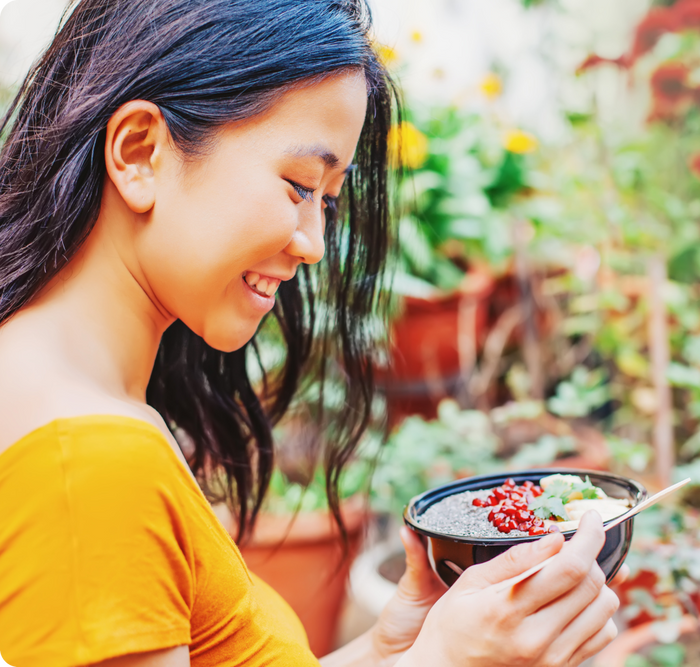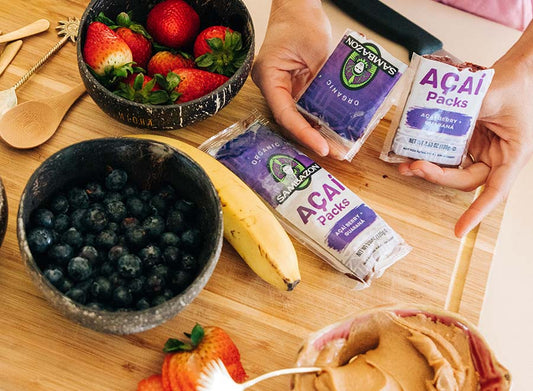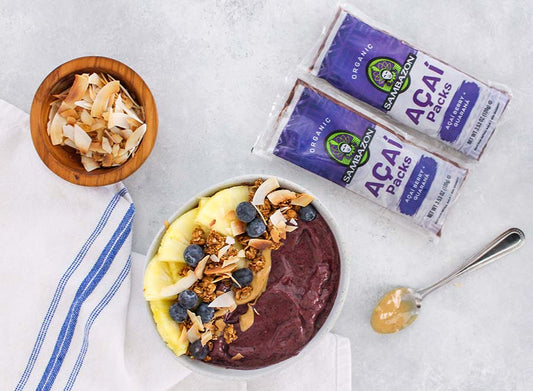If you’ve ever walked into a juice bar or beachside snack shack, you’ve probably seen the word Açaí in bold letters on the menu board. It adorns those tempting bowls full of fresh fruits and graces smoothies packed with protein and greens.
That said, if you’re unfamiliar with the superfood, you may hesitate before ordering. “Is Açaí vegan?” you ask yourself.
The answer? Yes! Açaí is 100% vegan—and that’s not the only thing to love about it.
In this comprehensive guide, we’ll be taking an in-depth look at Açaí and how it can fit into a healthy, vegan lifestyle.
What is Açaí?
Açaí (pronounced AH-sigh-EE) is a round berry that looks like a cross between a grape and a blueberry. The fruit grows on palm trees of the same name, which you’ll find sprouting throughout the rainforests of South America, especially in the Amazon.
While the Açaí may look like some of the fruits you can find at your local grocery store, its taste is anything but familiar. The earthy, exotic flavor of Açaí has been described as a blend of:
- Mixed berries (including raspberries, blueberries, and pomegranate)
- Red wine
- Dark chocolate
Sounds incredible, right? It is. There are so many other reasons to make Açaí a part of your diet—whether you’re a lifelong vegan or just flirting with the idea.
Is Açaí Always Vegan?
As a fruit, Açaí is naturally vegan on its own. However, most of us might not chow down on Açaí by itself. Instead, you’re more likely to see it added in as a frozen Açaí recipe such as:
However, in theory, most of these products could contain milk or eggs. As such, it’s always worth confirming ahead of time that the ingredients added into your Açaí bowl or smoothie are 100% vegan.
With that said, the exotic fruit is a health food staple, so the majority of Açaí products you see are vegan. The same goes for Açaí-based meals or snacks in cafes and restaurants.
The bottom line? Most foods that contain Açaí are probably vegan—and almost certainly vegetarian. But if you’re ever unsure whether or not a tasty treat is vegan, ask!
Why Vegan is a Good Thing
Now you know that Açaí is vegan. But so what? Why does it matter?
Well, there’s a whole heap of advantages related to veganism. Some are personal, individual benefits or religious reasons; others are far-reaching, stretching beyond the self.
Regardless of the reason that draws you to a vegan lifestyle, one thing is for sure: there’s a lot to gain from clean eating.
We know that going vegan may not be for everyone. But even if you’re not ready to commit to a fully vegan diet, you can still reap the benefits of veganism by cutting back on animal products.
1. Vegan Diets are Nutrient-Rich
Vegans cut meat, eggs, and dairy products out of their diet (and sometimes honey, but that’s a conversation for another time). In place of these foods, vegans “fill in the blanks” by eating a diverse array of fruits, veggies, nuts, and other healthy staples.
By increasing your consumption of vegetables and fruits (like Açaí), you also up your intake of essential vitamins and minerals. Vegan diets are often higher in must-have nutrients like:
- Vitamin C
- Vitamin E
- Magnesium
- Fiber
- Iron
- Folic acid (vitamin B9)
Other nutrients may be harder to find in vegan-friendly foods. While some worry about a link between nutrient deficiency and a vegan lifestyle, it’s easy enough to consume all of the vitamins and minerals you need. The secret lies in a varied, well-planned diet.
One trick is to eat your way around the rainbow. Fruits and vegetables differ in color because of different phytonutrients. The more you vary the color of fruits and vegetables in your diet, the more you expose yourself to these beneficial phytonutrients.
For red foods, reach for bell peppers and tomatoes. Yearning for yellow? Enjoy bananas, pineapples, and corn.
2. Veganism is Eco-Friendly
Switching to a more plant-based diet isn’t just good for you—it’s good for the planet.
If sustainability and the environment matter to you, one of the easiest ways to make an impact is to change your diet to favor more fruits and vegetables.
By avoiding animal products altogether, vegans remove themselves as participants in the livestock industry—one of the largest sources of greenhouse gasses.
Estimates vary, but the livestock industry contributes somewhere between 18% and 51% of global greenhouse gas emissions. The clearing of land for livestock grazing also contributes to deforestation and rising CO2 emissions. When that land is used for forests instead (including thick stands of Açaí palms), the result is a decrease in total CO2 production.
3. A Vegan Lifestyle Supports Animal Welfare
Beyond the environmental impact of animal farming, there’s the ethical question. Many vegans adopt the lifestyle because they don’t want to contribute to industries that may be harmful to animals. Even the most well-treated chickens, pigs, and cows didn’t choose to be there.
By making plant-based foods your priority, you remove the question of ethics from your dinner plate. A nice, vegan Açaí smoothie bowl in the morning won’t have you pondering the impacts of factory farming and the leather industry.
Eating vegan can have a positive effect on wild animals, too. Choosing to harvest the fruit of a tree rather than remove it encourages forests to grow naturally and allows endangered species to continue to use the area as their habitat.
FAQs About Açaí and Veganism
Do you still have burning questions about Açaí? Well, we have answers. Let’s look at some of the most common questions that come up around everyone’s favorite purple berry.
Is Açaí Vegetarian-Friendly?
Vegans avoid all products that come from animals. Vegetarians don’t eat meat, but may continue to enjoy animal products like:
- Milk
- Cheese
- Eggs
- Yogurt
Because Açaí contains no animal products whatsoever, it’s perfectly safe for vegetarians and vegans.
Which Form of Açaí is Best for Vegans?
Choosing an Açaí product is more about personal preference. Each option will have a different texture and flavor. So, an Açaí purée (smoothie) typically works best in bowls, while other frozen berries and other frozen fruit give you that thicker texture in a meal prepped smoothie or bowl. Other products will come with Açaí already packed in, so the choice will already be made for you.
Above all, feel free to experiment with the wonders of Açaí.
When Might an Açaí Product Not Be Vegan?
One of the most popular ways to enjoy Açaí is in a smoothie bowl. More often than not, Açaí bowls include a smoothie-like mixture of fruits—and that mixture may contain yogurt or ice cream.
Anytime you order an Açaí bowl or smoothie, be sure to specify that you want it to be vegan. If it’s being made fresh, you should be able to substitute any dairy products for plant-based alternatives in the shop’s smoothie or Açaí bowl recipe. Or you can play it safe and make your own homemade Açaí bowl. Just imagine a refreshing vegan Açaí bowl complete with toppings like fresh fruit, nut butter, vegan granola, coconut flakes, cacao nibs, and chia seeds. Talk about yum!
If you’re in the supermarket browsing for frozen desserts or sorbets, take a close look at the packaging. You shouldn’t even need to read the ingredients, as most brands will confirm that the product is vegan on the label. For example, all SAMBAZON Açaí products are vegan.
More Reasons to Love Açaí
Açaí comes with all kinds of other plusses. At SAMBAZON, our Açaí is:
- Organic – Our Açaí products are certified organic by the USDA and are GMO-free.
- Gluten-Free – That’s right: Açaí naturally contains no gluten, so go ahead and make some gluten-free smoothies that will be oh so delicious.
SAMBAZON: Açaí for All
Whether or not you’re vegan, Açaí sure is. And eating it by the bowlful can bring you one step closer to the healthy, sustainable life you’ve always dreamed of.
Ready to start adding Açaí to your diet? Try some of our best Açaí recipes around, and you’ll be a superfan of this superfood in no time.
Sources:
The American Journal of Clinical Nutrition. Health effects of vegan diets. https://academic.oup.com/ajcn/article/89/5/1627S/4596952
Harvard Health Publishing. Phytonutrients: Paint your plate with the colors of the rainbow. https://www.health.harvard.edu/blog/phytonutrients-paint-your-plate-with-the-colors-of-the-rainbow-2019042516501
NCBI. Environmental Effects of the Livestock Industry: The Relationship between Knowledge, Attitudes, and Behavior among Students in Israel. https://www.ncbi.nlm.nih.gov/pmc/articles/PMC6518108/








Comments
(0 Comments)Please note, comments need to be approved before they are published.